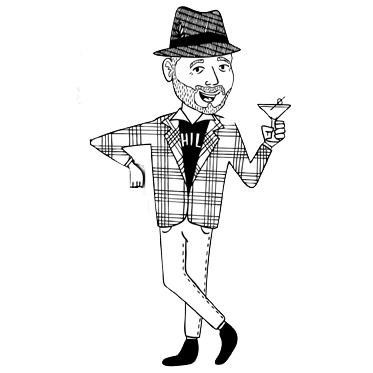 An enormous riot started in Philly on this date in 1964, wrecking North Philly, and while the looters may have gotten a few free goods, they destroyed any hope of future businesses coming to the area for decades. While local leader Cecil B. Moore tried to stem the looting, people ran wild, stealing everything they could get their hands on. This from TIME’s 1964 report on the story:
An enormous riot started in Philly on this date in 1964, wrecking North Philly, and while the looters may have gotten a few free goods, they destroyed any hope of future businesses coming to the area for decades. While local leader Cecil B. Moore tried to stem the looting, people ran wild, stealing everything they could get their hands on. This from TIME’s 1964 report on the story:
Rioters ran through the streets, shattered virtually every storefront window in a four-square-mile area. Looters dashed into the stores, grabbed racks of clothing, cases of liquor, groceries, furniture—anything they could move. They overturned cars, set fires, burned down a hat shop. Burglar alarms rang constantly.
Negro Leader Stanley Branche stood on a box at a street corner, used a bullhorn to plead: “Please go home. Please go home. This is doing us no good.” The mob answered with hoots, threw stones, bricks and bottles at him, hit him in the leg. Philadelphia N.A.A.C.P. President Cecil Moore shouted: “Come out of that store! Quit looting that store!”
As for the police response, they decided to pull back and let the rioting go on. This was severely criticized by Frank Rizzo, and the mayhem that ensued helped his political rise to power.
Policemen, severely outnumbered by the rioters, were ordered by Police Commissioner Howard Leary, who grew up in what had been the Irish Catholic section of North Philadelphia and worked his way through Temple University Law School at night, to do nothing. Frank Rizzo, who was to become, before the end of the 1960s, the police commissioner, and by 1971, the mayor, and was in 1964 the famous, most admired, and most hated, cop in Philadelphia, intensely disliked this strategy, feeling that a strong show of police force would nip the riot in the bud. He called Leary “a gutless bastard.”
The riots destroyed the neighborhood.
By Sunday, the fury was all spent, but nearly every store on Columbia Avenue, the central shopping district of North Philadelphia, had been destroyed. The riot signaled the beginning of the end of North Philadelphia as a largely working-poor neighborhood…Many of the stores never reopened, and the neighborhood began its descent into the chaos of an underclass realm.
It was a depressing time to be in Philly, as a couple weeks later, the Phils started their famous swoon.


This is exactly why I visit this sight. To watch my quizzo team free fall out of the top 10 and be totally enlightened by something I had absolutely no idea about ('64 riots and potential new Pee Wee screenplay).
Frank Rizzo was kind of a dick, no?
I was a kid in 1964, and I remember both the scary riots in North Philly as well as the Phillies' collapse and loss of the pennant. But the weird thing is that although I remember both, I do not remember them as happening concurrently and I do not associate the two in my mind. Incidentally, the riots in Philadelphia were not unique, but were merely one of a large number of urban riots that happened across the country at the time.
And I don't know if I would summarily dismiss Frank Rizzo as a “dick.” (Why is it necessary for you intellectual children to reduce people and historical events to simplistic categories? Maybe you should learn at some point that there are no simple people, and that history is not a moral fable that the superior people of the present get to impose on their ignorant, prejudiced. bigoted and morally benighted ancestors.)
I didn't call Rizzo a dick Bob, I said he was “kind of” a dick. That allows for much more complexity in his character! Actually, you could have a fascinating debate over the pros and cons of his reign and policies- and their effects. I met him once and he was very nice to me-then again I was(and am currently)white. To be kind, I think that a large portion of his decisions were affected by his prejudices. Either way, I am certain that Rizzo would have been terrible at Quizzo.
Interesting. I met Rizzo once also– at a wake. He was a very charming man in person, and people generally liked him on a personal level. (An attribute of many successful politicians, I suppose.) I should point out that he had many black supporters and political associates. He was a firm proponent of what people used to call “law and order,” but I don't think that makes him a racist. He had an unfortunate tendency to overreact to situations, sometimes making bad situations worse. He could also be counted on for more than his fair share of gaffes and “misstatements.” And since I was a liberal Democrat in my misspent and misguided youth, I was very anti-Rizzo at the time.
Dan's funny. We need more Dan.
Rizzo was a man's man and a gentleman. He knew when to be tough and when to be gentle. The liberal media has done and is still doing a thorough hatchet job on this man and his legacy. He kept this town afloat in it's darkest hours and never got any thanks, only constant harrassment and ridicule. He was a great guy and understood the “neighborhood system” here in Philly. If you look at Philly today, you can see that a need for a Frank Rizzo exists.